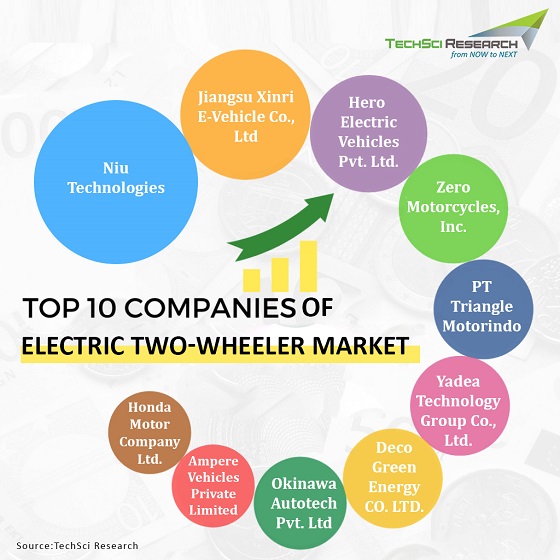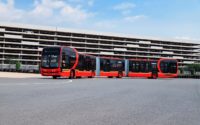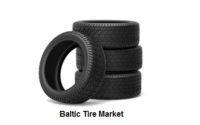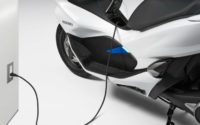Unplugged and Unleashed: Embracing Electric Two Wheeler Landscape
According to International Energy Agency, the Electric two wheeler volume of sales has been highest in China. Along with it, China shows a major spike in the sales of its electric two/three wheelers in 2021. Vietnam being an emerging country in terms of automotive industry, follows to contribute next to China in the global share. In the pursuit of a greener and more sustainable future, the automotive industry has witnessed a significant paradigm shift with the rise of electric mobility. Among the various electric vehicles, electric two-wheelers have emerged as a prominent solution for urban transportation challenges. The increasing popularity of electric vehicles can be attributed to the concerns regarding environmental impact of traditional petrol-powered vehicles.
Electric vehicles contribute to the reduction of air pollution and combat climate change by producing zero tailpipe emissions. Furthermore, governments and organizations worldwide are implementing stricter regulations and offering incentives in the form of tax credits, grants, and subsidies to promote the adoption of electric vehicles. In recent years, there have been significant advancements in battery technology, resulting in improved range and performance of electric vehicles. Lithium-ion batteries, for example, have become more energy-dense and affordable, making electric vehicles more practical for everyday use. Additionally, the charging infrastructure for electric vehicles is expanding, with more public charging stations being installed in various locations, making it easier for EV owners to recharge their vehicles.
Concluding Real World Implementation of Electric Two Wheeler
The UN Environment Program (UNEP) is currently supporting electric two wheeler projects in sixteen countries in Africa, Asia, and Latin America & the Caribbean. These countries include Ethiopia, Morocco, Kenya, Rwanda, Uganda, Burundi, Madagascar, Sierra Leone, Tanzania, Togo, Philippines, Thailand, Vietnam, Bangladesh (UNDP), India, Maldives, and Nepal. India has made significant progress in promoting electric two wheelers. For instance, the faster adoption and manufacturing of hybrid and electric vehicles in India. Under FAME scheme, the government provides subsidies to consumers purchasing electric two wheelers. Electric two wheelers, particularly electric scooters, are widely used for daily commuting in cities like Beijing and Shanghai. The Chinese government has implemented policies and regulations to encourage the production and use of electric two wheelers, promoting their benefits for reducing air pollution and improving urban mobility.

Real-world implementations of electric two-wheelers have provided valuable insights for informed future developments and strategies for promoting electric mobility. The availability of a robust and widespread charging infrastructure is crucial for the successful adoption of electric two-wheelers. Convenient access to charging points, both at home and in public places, to address range anxiety and regular usage is important. Advancements in battery technology, such as higher energy densities and faster charging capabilities, are essential to improve the overall appeal and usability of electric two-wheelers. Promoting road safety and providing proper education on handling and maintaining electric two-wheelers are vital. Ensuring that users understand the unique features of electric vehicles and the importance of safety precautions will lead to responsible and safe usage.
Also, raising the public awareness about the benefits of electric two-wheelers and dispelling myths or misconceptions is essential. Marketing and communication campaigns can help change the perception of electric vehicles and drive higher acceptance rates. Integrating Electric two-wheelers with public transportation and rideshare services can complement existing urban transportation systems. Collecting data on the usage patterns, charging habits, and overall performance of electric two-wheelers is valuable for assessing their impact on urban mobility and identifying areas for improvement.
Powering ahead: Key supporters of Electric Two Wheeler Market
Collaboration between battery suppliers and electric two-wheeler manufacturers allows for the sharing of expertise, resources, and technologies to develop batteries that meet the specific requirements of electric two-wheelers. They may conduct joint R&D projects aimed at improving battery technology, such as increasing energy density, enhancing charging capabilities, and extending battery life. These collaborations may involve sharing research facilities, conducting joint experiments, and exchanging technical knowledge and insights. Additionally, battery suppliers collaborate with electric two-wheeler manufacturers in the testing and validation of battery solutions, which involves integrating the batteries into the vehicles and conducting comprehensive performance evaluations, safety tests, and validation processes. Bosch collaborated with electric two-wheeler manufacturers to provide battery solutions that are optimized for performance, safety, and efficiency.
Battrixx provides lithium-ion battery packs for electric scooters and high-performance lithium-ion battery packs with in-house designed intelligent BMS protection. ACME Cleantech Solutions Pvt. Ltd., Amara Raja Batteries Ltd., Ample Technologies Private Limited, and ANI Technologies Pvt Ltd (Ola) are key players in the EV battery swapping for two- and three-wheeler market. Shenzhen Tianlihe Technology Co., Ltd. (TLH Battery) is a premier supplier and manufacturer of electric bike batteries. BENZO Energy is a lithium-ion battery manufacturer based in China. DNK Power Company Ltd. is a lithium rechargeable battery pack manufacturer based in China. Shenzhen TL New Energy Co., Ltd., Liaocheng Jiangbei Tianneng Battery Co., Ltd., and Shenzhen Batterybuilding Industry Co., Limited are among the electric bike battery manufacturers and suppliers listed on Made-in-China.com.

The companies operating in the electric two-wheeler charging infrastructure market are expanding their dealership and distribution networks to meet the increasing demand for electric two wheeler charging. For example, the United States government announced that the Supercharger network, DC fast charging stations, will be open to other types of electric vehicles in 2021. These companies focus on developing fast chargers for electric two wheeler to boost their market share in the electric two-wheeler charging infrastructure market. The advanced digital infrastructure public spending program includes key areas such as 5G networks, industrial internet, inter-city transportation and rail systems, data centers, AI, ultra-high voltage power transmission, and new-energy vehicle charging stations.
According to TechSci Research Report, “Electric Two-Wheeler Charging Infrastructure Market – Global Industry Size, Share, Trends, Competition, Opportunity and Forecast, 2016-2026, Segmented By Type (AC, DC), By Charging Mode (Plug-in, Wireless), By Installed Location (Residential, Commercial), By Connector Type (UK 3-Pin, Industrial Commando, Type 1, Type 2, CHAdeMO, and CCS), By Type of Charging (Slow, Fast), By Region”, Global electric two-wheeler charging infrastructure market is anticipated to grow at a CAGR of 32.09% during the forecast period to reach USD 11,790.60 million by 2026.
Some of the leading companies in the industry include ChargePoint, Inc., Schneider Electric SE, EVBox B.V., ABB Ltd., Siemens AG, Eaton Corporation Plc, Royal Dutch Shell Plc, Blink Charging Co., TGOOD Global Ltd., and Exicom Tele-Systems Limited. These companies focus on developing electric vehicle fast chargers to boost their market share in the global electric two-wheeler charging infrastructure market. Amongst these, ChargePoint, Inc. is the leading player with headquarters in California, United States. The company offers two types of charging stations in the electric two-wheeler charging infrastructure market: AC charging stations and DC fast charging stations. Under the AC Charging Station category, they provide the CT4000 and CPF50 models. The CT4000 is an all-purpose level 2 charging station, while the CPF50 is designed for fleet and multifamily use. In the DC fast charging station category, they offer the Express 250, known for its high power in a small footprint, and the Express Plus, a scalable and high-power fast charging platform.
Company overview of Top 10 Electric Two Wheeler Companies
The leading companies which head towards the dynamic and competitive landscape of global electric two wheeler market are Niu Technologies, Jiangsu Xinri E-Vehicle Co., Ltd., Hero Electric Vehicles Pvt. Ltd., Zero Motorcycles, Inc., PT Triangle Motorindo, Yadea Technology Group Co., Ltd., Deco Green Energy CO. LTD., Okinawa Autotech Pvt. Ltd, Ampere Vehicles Private Limited, and Honda Motor Company Ltd.
Niu Technologies
Headquartered in: Changzhou, China
The company offers a well-organized product portfolio comprising seven series, including NQi, MQi, UQi, NIU Aero, Gova, RQi, and Tqi. MQi and UQi won all seven major international design awards in the past 20 years. Also, The company operates in 13 countries providing SaaS solution for electric two-wheeler, and continues to expand support for sharing businesses globally with 20 sharing operators.
Jiangsu Xinri E-Vehicle Co. Ltd.
Headquartered in: Jiangsu, China
Jiangsu Xinri E-Vehicle Co., Ltd. is a Chinese e-vehicle industry with four production bases located in Wuxi, Tianjin, Xiangyang, and Guangdong. The company offers a range of products, including motorcycles, mopeds, bicycles, and e-cars. The motorcycles offered by the company are the MIKU MAX and MIKU SUPER models, while the mopeds are available in the Abner, Leo, and Hawk models. The company also offers utility mopeds, which are available in the Swift and Robo-SC models.
Hero Electric Vehicles Pvt. Ltd.
Headquartered in: Gurugram, Haryana, India
Hero Electric Vehicles Pvt. Ltd. is a leading electric two wheeler company in India. The company provides electric mobility solutions, including motorcycles, and other related products. Hero Electric has registered the best-ever calendar sales in 2022 for electric scooters. The company is a part of the Society of Manufacturers of Electric Vehicles (SMEV), India.
Zero Motorcycles, Inc.
Headquartered in: Scotts Valley, California, United States
Zero Motorcycles, Inc. is an electric motorcycle manufacturing company founded in 2006. Zero Motorcycles, Inc provides simple ways to charge the electric motorcycle in which the Zero’s FX, FXS, S, and DS models that require no additional equipment or installations for the charging and the SR/F model can access any outlet with an optional EVSE cable only needed to plug it into any nearest outlet. The company produces high-performance electric motorcycles Z-Force electric powertrain and uses a specially designed rigid, aircraft-grade aluminum frame to minimize weight.
PT Triangle Motorindo
Headquartered in: Jakarta, Indonesia
The production plant is located in Bukit Semarang Baru. PT. Triangle Motorindo has been able to produce motorcycles with a production capacity of up to 1000 units per day. The company offer motorcycles by the model names, Cross X 70 Mini Trail, Cross X 100 Mini Trail, Cross X DB150, Razor 100 SP, VIAR Q1, and AKASHA.
Yadea Technology Group Co., Ltd.
Headquartered in: Yunnan Province, China
Yadea Technology Group Co., Ltd offer products in two-wheeler by the category electric scooter, electric kick scooter, and electric bicycle. The company offer electric scooter by the model’s name Yadea G5 and Yadea C1S. The Yadea electric kick scooter are offered by the model’s name KS5, KS5Pro, and KS3.
Deco Green Energy Company Limited
Headquartered in: Nakhon Pathom, Thailand
Deco Green Energy Company Limited was founded in the year 2006. The company offer electric motorcycle by the model’s name MaxOne, and Sylla. The electric moped are offered by the model’s name such as Super Ace, Luciano, EKON, SALLY, HANNAH, and SOFIA. Also, the company provides Service and spare parts such as battery and motors etc.
Okinawa Autotech Pvt. Ltd
Headquartered in: Haryana, India
Okinawa Autotech Pvt. Ltd is a 100% Indian electric two-wheeler manufacturing company that was established in the year 2015. The company offers light commercial electric motorcycles with the models named DUAL 28AH, DUAL 35AH, and DUAL 55AH. Its production plant is located in Khushkhera, Rajasthan, India.
Ampere Vehicles Private Limited
Headquartered in: Coimbatore, Tamil Nadu
Ampere Vehicle Private Limited is a subsidiary of Greaves Electric Mobility Pvt Ltd. and was founded in the year 2008. The company offers electric two-wheelers with the model names Magnus, Zeal Ex, Reo, Reo Elite, V48, Magnus 60, and User Manual. The company has more than 350 dealerships across India for its electric two-wheelers.
Honda Motor Company Limited
Headquartered in: Minato City, Tokyo, Japan
Honda Motor Co., Ltd. offers a range of two-wheeler series, including MotoGP, WorldSBK, MXGP, Rally, Trial, EWC, and AMA-SX-MX. They have various models such as Gold Wing, CB1100, CRF1100L Africa Twin, CBR1000RR-R SP, CB1000R, X-ADV, Rebel 500, CBR600RR, CB125R, ADV150, and CB250R/CB300R. The company operates globally, with regional headquarters like Honda Motor Europe Ltd. (U.K.) in the United Kingdom.
Conclusion
Overall, the price range of electric two-wheelers globally can vary widely, ranging from affordable options in certain markets to higher-end models with advanced features and performance. The average price range of electric two-wheelers globally can vary depending on various factors such as brand, model, features, and region. Most electric two-wheelers sold in India and China fall in the range of USD 400 to USD 1400.
According to TechSci Research Report, “Electric Two-Wheeler Market – Global Industry Size, Share, Trends, Competition, Opportunity and Forecast, 2016-2026, Segmented By Vehicle Type (Scooter/Mopeds, Motorcycle), By Range (Less than 50Km, 50-100Km, 101-150Km, and Above 150Km), By Battery Capacity (<25Ah, >25Ah), By Battery Type (Lead Acid, Li-ion), By Region.” The global electric two-wheeler market size exceeded 10 million units and is expected to grow at a CAGR of around 9.36%. Asia-Pacific held the largest market share in past years and the same trend is expected to follow. Rapidly increasing urbanization, expanding charging infrastructure network, growing discretionary income are driving the growth of the global electric two-wheeler market in the upcoming five years.
Electrification of two-wheeler fleets, such as delivery services and ride-hailing platforms, can have a significant impact on reducing emissions in urban areas. Businesses can play a role in promoting sustainable transportation by adopting electric two-wheelers in their operations. The electric mobility landscape is continuously evolving. Innovation in battery technology, vehicle design, and smart features can enhance the appeal of electric two-wheelers and keep them relevant in the market.



